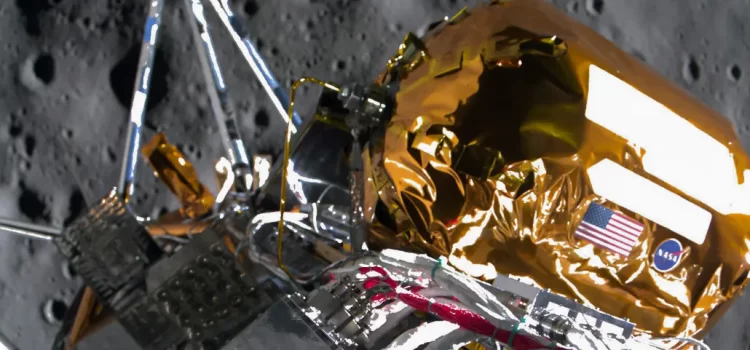
This is a free excerpt from one of Shortform’s Articles. We give you all the important information you need to know about current events and more.
Don't miss out on the whole story. Sign up for a free trial here .
What does the Odysseus moon landing mean for the future of space travel? How can the space industry sustain its growth and maximize its impact on the economy?
The February Odysseus moon landing, funded by private investment, has reignited global interest in space. Private companies like SpaceX, Blue Origin, and Virgin Galactic will play a pivotal role in the evolution of the space economy, fostering innovation, competition, and space exploration.
Keep reading to learn about Odysseus and its implications.
Image Credit: OFFICIAL INTUITIVE MACHINES PHOTOS (CC BY-NC-ND 2.0 DEED)
Odysseus Renews Interest in Space Exploration
Half a century after humans last set foot on the moon, a commercial lunar lander named Odysseus has returned. The Odysseus moon landing not only marks a remarkable milestone in space exploration, but it also paves the way for a dynamic space economy that could fuel job creation and foster new opportunities for enterprises.
Background
Odysseus successfully touched down on the moon on February 22. Its main objective was to jump-start a lunar economy by demonstrating the possibilities of commercial spaceflight, and in doing so, build on an already growing space economy that includes satellite services, manufacturing, and research.
Odysseus’ groundbreaking mission was born of a collaboration between NASA and private stakeholders, and it shows the vast potential of such partnerships. Advances in space exploration, facilitated by commercial entities, likely will dictate the path of future space endeavors, and will be a catalyst for exponential economic growth fueled by space initiatives.
Private Enterprise Powers Space Aspirations
In an arena once dominated by government agencies, private firms like SpaceX, Blue Origin, and Virgin are taking the helm in the race to the final frontier. These companies are leading developments in space tourism and communications, and they’re also launching rockets, deploying satellite constellations, and exploring a variety of opportunities for the space sector.
- SpaceX, founded by Elon Musk, marked a milestone as the first private corporation to launch humans into space.
- Blue Origin, founded by Jeff Bezos, is focused on developing technologies for space tourism, research, and suborbital flights.
- Virgin Galactic, founded by Richard Branson, aims to provide suborbital space flights to space tourists and to conduct research missions.
Developments in the Space Economy
Private enterprises’ efforts are fostering competition, lowering costs, and increasing innovation in several sectors, including:
1. Space Exploration and Transportation
- Reusable launch vehicles. These spacecraft, designed to return to Earth after delivering a payload into space, offer a more cost-effective, eco-friendly way to explore space.
- Space research and development. Technological advances and public-private partnerships have made it more affordable for non-aerospace industries to undertake space-related projects.
2. Space-Based Services and Connectivity
- Satellite constellations. Networks of coordinated satellites offer expanded internet services in remote regions.
- Space data-as-a-service. Advanced technologies like AI and edge computing are enabling businesses to leverage space data for applications from military communications to environmental monitoring.
3. Orbital Manufacturing and Resource Extraction
- In-space biomedical manufacturing. Technological advances might allow biomedical companies to relocate some operations to orbit. Potential applications include growing transplant organs and manufacturing new drug treatments.
- Space mining. Mining of precious metals and rare elements from other planets, moons, and asteroids.

Want to fast-track your learning? With Shortform, you’ll gain insights you won't find anywhere else .
Here's what you’ll get when you sign up for Shortform :
- Complicated ideas explained in simple and concise ways
- Smart analysis that connects what you’re reading to other key concepts
- Writing with zero fluff because we know how important your time is






